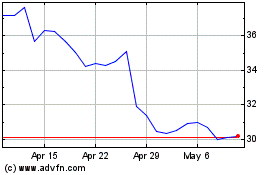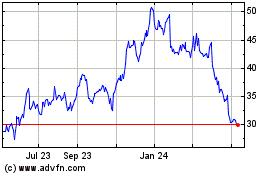By Ted Greenwald
The revelation that Intel Corp. is considering buying Broadcom
Ltd., a company valued at more than $100 billion, shows the depth
to which the chip giant feels threatened by a potential tie-up
between Broadcom and its rival Qualcomm Inc.
Since late last year, Intel has been exploring a bid for
Broadcom to forestall that company's $117 billion offer for
Qualcomm in what would be the biggest-ever tech deal, people
familiar with the matter told The Wall Street Journal in an article
published Friday. Intel's interest in derailing that deal reflects
its worry that a combined Broadcom-Qualcomm, which would create the
third-largest chip company by revenue after Intel and Samsung
Electronics Co., would endanger its competitive position, the
people said.
A merged Broadcom and Qualcomm would combine market-leading
smartphone chips with a strong presence in data centers, two areas
Intel has targeted for growth. And Qualcomm's own proposed purchase
of Dutch automotive chip specialist NXP Semiconductors NV would
turbocharge such a merger in the automotive market, where Intel has
placed one of its biggest bets.
"You'd have this powerhouse going up against you," said analyst
Stacy Rasgon of Bernstein Research, noting the combined revenue of
Broadcom and Qualcomm -- nearly $40 billion in fiscal 2017 -- would
be formidable even relative to Intel's $63 billion in the same
year. Nonetheless, he finds an Intel-Broadcom merger unlikely.
There are several reasons why such a combination may not happen.
Intel is weighing a range of alternative acquisitions, the Journal
reported Friday, and a hostile Broadcom offer would present
enormous challenges of financing, complexity and regulatory
scrutiny.
Intel has made relatively few big deals in its 49-year history
-- the largest was in 2015 when it acquired Altera Corp. for $16.7
billion -- and it has previously had a spotty track record of
folding them in.
Intel in a statement said its focus is on integrating its recent
purchases and "making them successful for our customers and
shareholders." The company declined to comment further.
An Intel-Broadcom tie-up may not even make sense in terms of
strengthening Intel, according to some analysts. "I don't think
there's any benefit to Intel," said Handel Jones, a consultant at
International Business Strategies. In particular, he said,
Broadcom's products wouldn't mesh well with Intel's manufacturing
operations, where the chip giant could use additional volume to
reduce costs.
But the prospect that Intel could bid for Broadcom reflects
tectonic forces reshaping the semiconductor industry as chips make
their way into all manner of consumer and industrial products, from
smart speakers to urban infrastructure.
Intel, with a market capitalization of about $243 billion, holds
over a 90% share in its core markets of processor chips in personal
computers and data-center servers, according to Mercury Research,
leaving it scant room to grow in those areas as PC shipments
continue their persistent decline.
Intel has responded, among other initiatives, by moving
aggressively into cellular communications chips, where it has
replaced Qualcomm units in a portion of Apple Inc.'s iPhones and
made inroads with the next-generation 5G cellular specification. It
has advanced into the automotive industry with its $15.3 billion
purchase of Mobileye NV, a leader in sensors for assisted driving
features like automated lane keeping and collision avoidance. And
it has doubled down on its data-center business, supplying
companies like Amazon.com Inc. and Microsoft Corp. that are
spending tens of billions annually on hyperscale cloud-computing
facilities.
Hitching Broadcom, whose management style has driven a
seven-fold increase in its share price over five years, to
Qualcomm, whose products form the bedrock of the mobile market,
could threaten Intel's progress in all three areas.
Broadcom declined to comment. Qualcomm didn't immediately
respond to requests for comment.
Qualcomm has focused on developing key cellular technology,
playing a leadership role in 5G. That research keeps its chips
ahead of the competition, and it has resulted in a patent portfolio
that yields a royalty on nearly every smartphone sold, whether or
not they contain Qualcomm chips -- a revenue stream that typically
provides most of Qualcomm's pretax profit.
Since early 2017, though, Qualcomm has been in a bitter legal
war with Apple over its royalty rates, which the iPhone maker
alleges are unfair. Qualcomm hasn't been able to resolve the
conflict quickly, and Apple is considering replacing Qualcomm chips
entirely with products from rivals including Intel.
Broadcom also sells chips to Apple, and its chief executive,
Hock Tan, claims to have a strong relationship with the iPhone
maker. If Broadcom took over Qualcomm, he believes he could resolve
the Apple dispute. In that case, Apple could boost Qualcomm's
presence in iPhones at Intel's expense, especially as 5G ramps up
in coming years.
A combined Broadcom-Qualcomm also could wreak havoc on Intel's
ambitions in self-driving cars. Qualcomm's acquisition of NXP
awaits antitrust approval in China, its final regulatory hurdle,
which Qualcomm has said it expects soon. Completing the purchase
would pave the way for Qualcomm's 5G chips and self-driving tech.
The extra heft that Broadcom would give that combination could
create a counterweight to Intel and Mobileye.
Broadcom also sells switches to makers of data-center equipment,
while Qualcomm is pushing into data centers with server processors
that compete directly with Intel's. The prospect of selling
Qualcomm's server chips through Broadcom's data-center channels may
give Intel pause.
And Mr. Tan likely wouldn't stop there. He built Broadcom on a
string of ever bolder acquisitions. Having rolled up Qualcomm -- if
his takeover effort gets that far -- he could continue to enlarge
his portfolio of market-leading franchises, potentially blocking
Intel's efforts at every turn.
--Dana Mattioli and Dana Cimilluca contributed to this
article.
(END) Dow Jones Newswires
March 11, 2018 16:55 ET (20:55 GMT)
Copyright (c) 2018 Dow Jones & Company, Inc.
Intel (NASDAQ:INTC)
Historical Stock Chart
From Mar 2024 to Apr 2024

Intel (NASDAQ:INTC)
Historical Stock Chart
From Apr 2023 to Apr 2024
